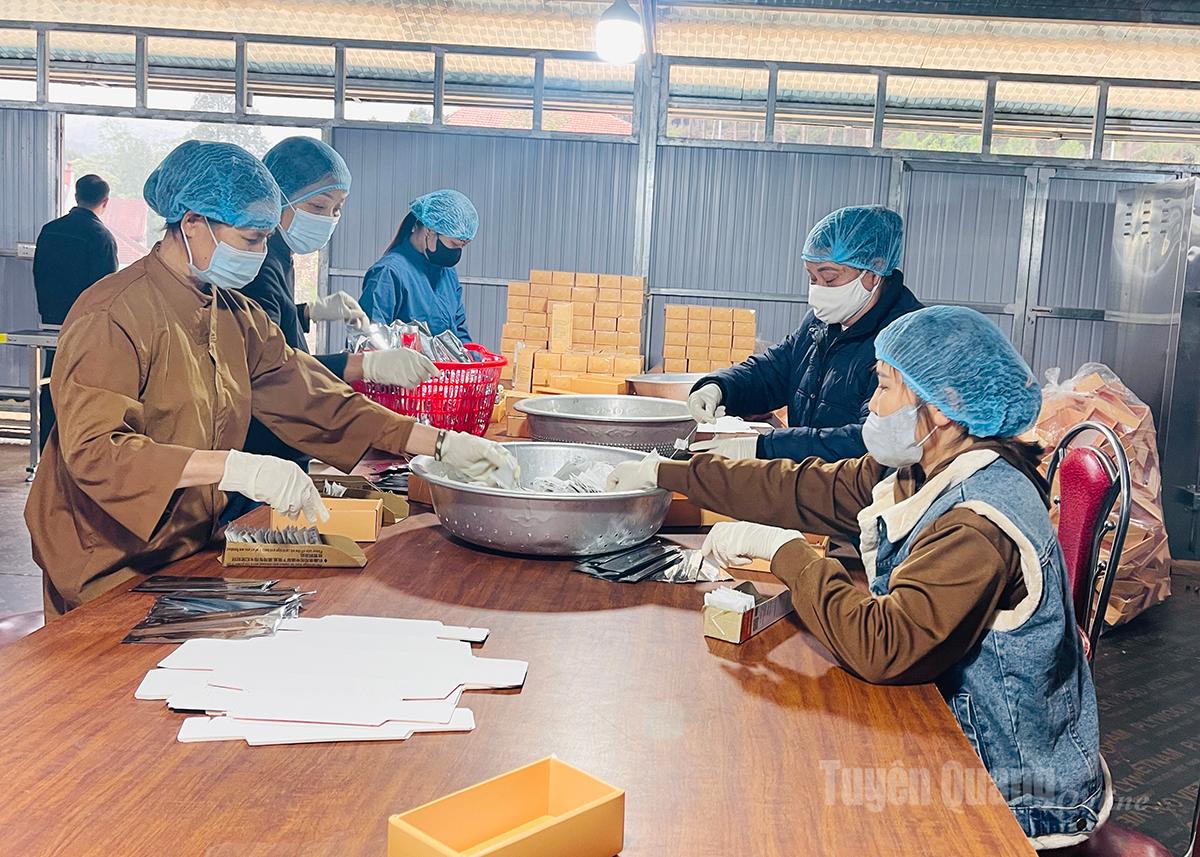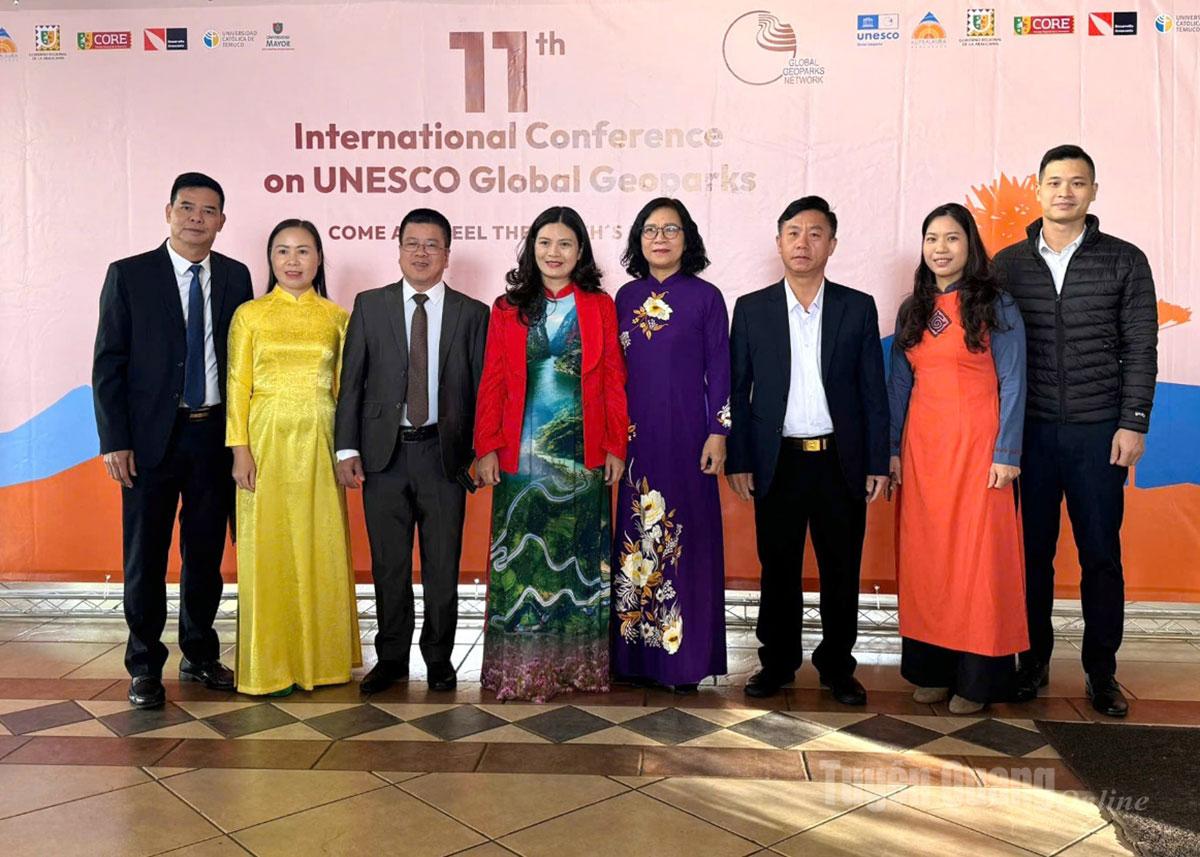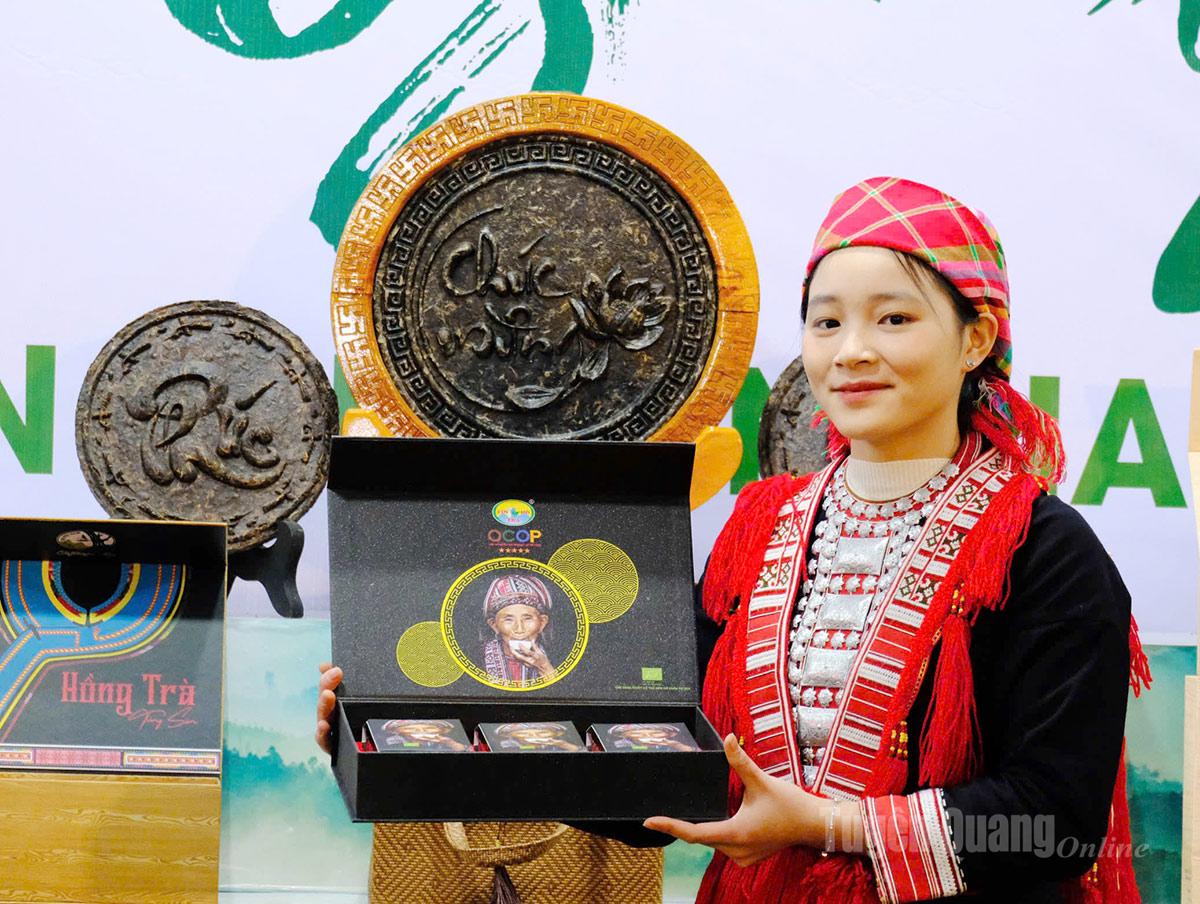The Heartland of Ancient Shan Tuyet Tea
At daybreak, we follow a winding footpath to Tham Ve village in Cao Bo Commune - one of the most renowned strongholds of ancient Shan Tuyet tea trees along the Tay Con Linh range. Deep in the primeval forests, these towering trees stand as living witnesses of time. Their roots clutch the earth, their canopies stretch into the clouds, and their trunks are covered in moss.
Dang Van Canh, nearly 80, gently places his hand on a tea tree and softly whispers, as if speaking to an old friend: “When I was born, this tree was already grown. It has outlived lifetimes.”
Tuyen Quang province is home to over 19,000 hectares of Shan Tuyet tea, stretching across Cao Bo, Thuong Son, Viet Lam, Thanh Thuy, Thong Nguyen, Ho Thau, Nam Dich, and Ha Giang Ward - and reaching the high mountains of Hong Thai, Con Lon, and Thuong Nong. More than 93% of the province’s Shan Tuyet tea is concentrated along the Tay Con Linh range.
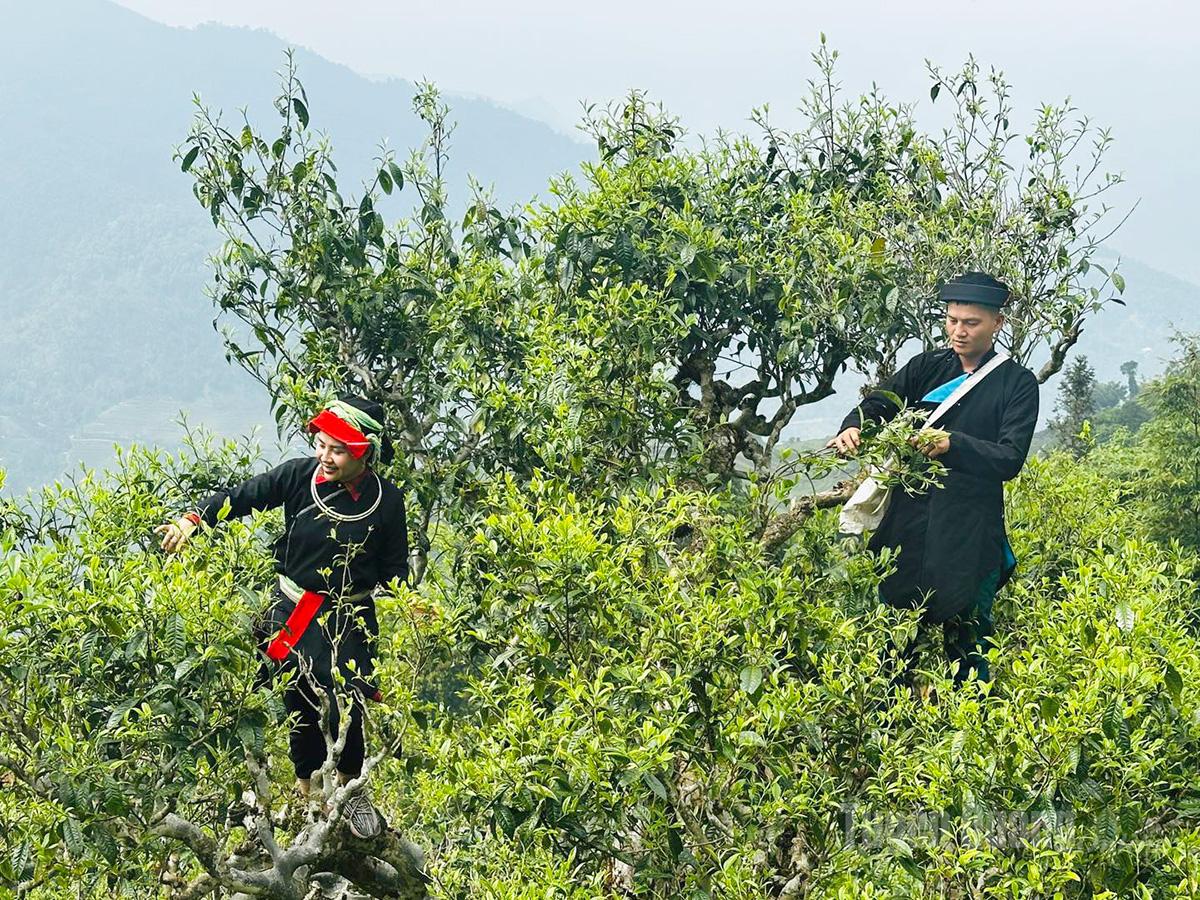
Dao farmers in Thanh Thuy Commune harvest ancient Shan Tuyet tea on the Tay Con Linh range
This region has been certified by the International Tea Committee (London) and the Vietnam Tea Association as the country’s largest organic tea-growing zone. It also holds geographical indication status granted by the Intellectual Property Office of Viet Nam.
Shan Tuyet tea thrives at elevations of 700 meters and above, with many trees over 500 years old growing at altitudes beyond 2,000 meters. The cold, humid climate, blanketed year-round in mist, gives rise to leaves infused with mountain air and dew - producing a tea with rare and distinctive flavor.
Scientists consider these trees a national genetic treasure, critical for conserving and developing native Vietnamese tea varieties. More than 1,600 ancient Shan Tuyet tea trees in the province have been recognized as national heritage trees. Additionally, over 11,600 hectares of tea cultivation meet GAP (VietGAP and organic) standards across 65 production areas.
Each brewed cup of Shan Tuyet glows golden like honey, carrying a light mountain aroma. It starts with a slight astringency and finishes with a lingering sweetness - an essence shaped by nature, time, and the hands of highland farmers.
Green Gold on the Mountain Peaks
In this season, although the sun rises early, the slopes remain veiled in mist. Ancient tea trees, cloaked in moss, emerge like figures from a fairytale.
Ban Thi Hom, a Dao woman from Xa Phin village in Thanh Thuy Commune, has devoted her youth to the ancient Shan Tuyet tea.
“Since I was a child, I followed my mother up the mountain to pick and roast tea by hand, then sell it at the local market,” she recalls. “After graduating from university, I chose not to stay in the city - I came home to start a business rooted in Shan Tuyet.”
Today, she runs a processing workshop, partnering with 10 households to purchase all fresh tea buds. Her operation produces a variety of specialty teas such as one-bud-one-leaf, Mao Jian, Puerh, White Peony, Bamboo Tube Tea, and Dragon Claw Tea. After expenses, her family earns more than 150 million VND (approx. $5,900 USD) annually.
Thanh Son Company, based in Ha Giang Ward, is pioneering the integration of science and innovation in Shan Tuyet tea production. In a special facility constructed with over two tons of fermented Shan Tuyet tea, Deputy Director Pham Thi Minh Hai shares the story behind their 400-hectare raw tea zone along the Tay Con Linh range.
Their high-end offerings include black tea, white fairy tea, green tea, and compressed cakes. Particularly, their White Fairy Tea - harvested from trees over 500 years old at 2,000 meters altitude - commands a price of nearly 20 million VND/kg (approx. $790 USD). Their products have won prestigious international awards, helping elevate Vietnamese tea on the global map.
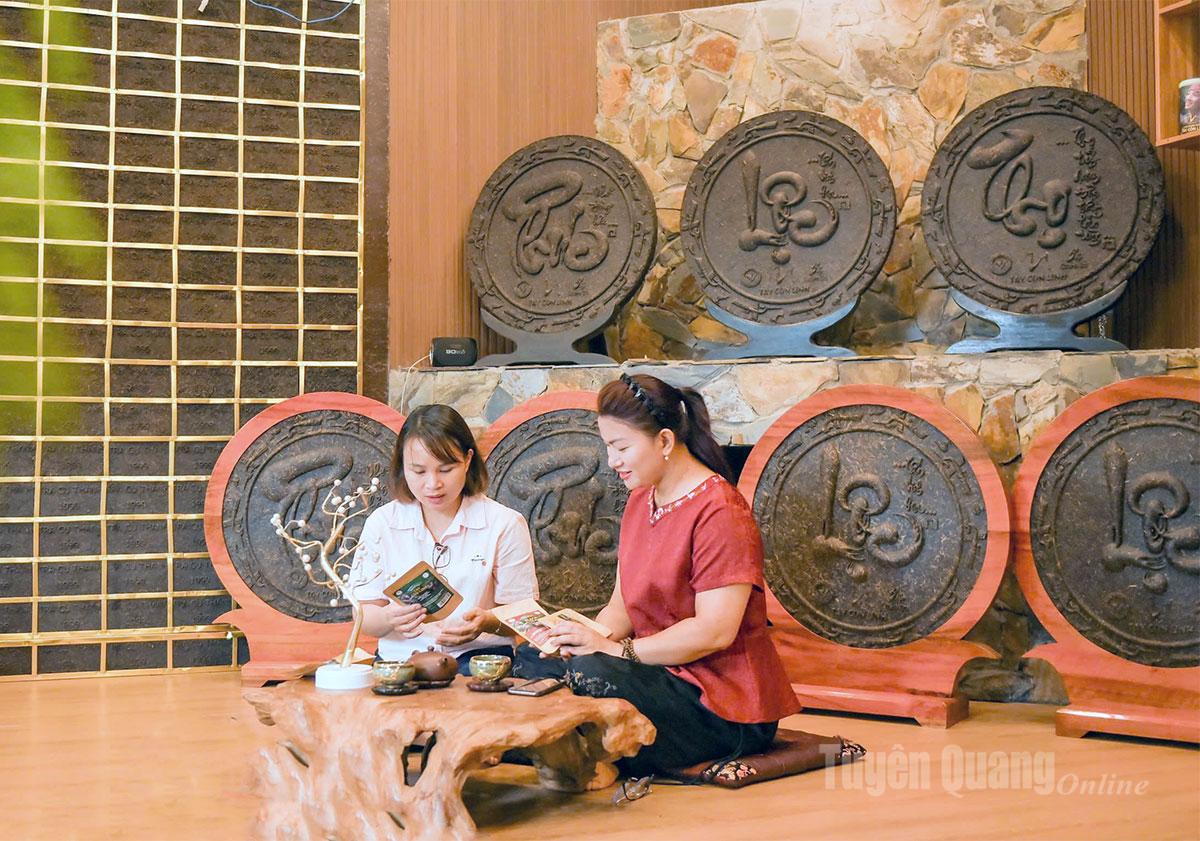
Pham Thi Minh Hai (right), Deputy Director of Thanh Son Co., Ltd., showcases premium tea products being prepared for export to the U.S.
“Shan Tuyet is a rare gift of nature to Tuyen Quang,” Hai says. “Beyond traditional brews, we’re developing tea-based health and skincare products, so consumers can enjoy Shan Tuyet in new ways. Many households now earn between 30 to 60 million VND per year from tea production.”
The province has identified Shan Tuyet as a key crop in its agricultural restructuring strategy. Nearly 14,000 hectares are currently in harvest, yielding around 68,000 tons annually - over 62,000 tons of which come from Tay Con Linh alone. With 102 enterprises, cooperatives, and processing facilities, the tea sector contributes over 700 billion VND (approx. $27.6 million USD) annually to the local economy.
Shan Tuyet is more than a crop - it is the “green gold” of Tay Con Linh, a quiet force sustaining livelihoods and inspiring a vision for prosperity in the northern highlands.
A Journey to the World
From high mountain slopes to discerning consumers in Europe, Japan, the U.S., and Taiwan, the journey of Shan Tuyet tea has been long and challenging - but it reflects both the brand’s rising reputation and the ambition of people daring to dream big in the highlands.
In 2008, the Phin Ho Tea Cooperative was founded in Thong Nguyen Commune with 50 members of the Dao Red ethnic minority. Its goal: to connect producers with markets and promote Shan Tuyet to domestic and international consumers. A decade later, the cooperative exported over 20 tons of dried tea to Taiwan for the first time, marking a significant breakthrough for its Fin Ho Tra brand.
Phin Ho Tea now produces more than 670 tons annually, offering high-end products such as green tea, black tea, white tea, jasmine-infused tea, and wild teas like Dragon Claw and Shan Fairy. The cooperative has obtained EU Organic certification and is standardizing raw material zones to meet global requirements.
Its products have earned numerous awards, including an international Gold Medal for white tea, a Silver for green tea in Asia, and most recently, the Golden Leaf Awards 2024 in Australia. Two products - green tea and black tea - have received Viet Nam’s national 5-star OCOP certification. Phin Ho Tea is now sold in France, Germany, Taiwan, and on Amazon, with exports exceeding 100 tons annually.
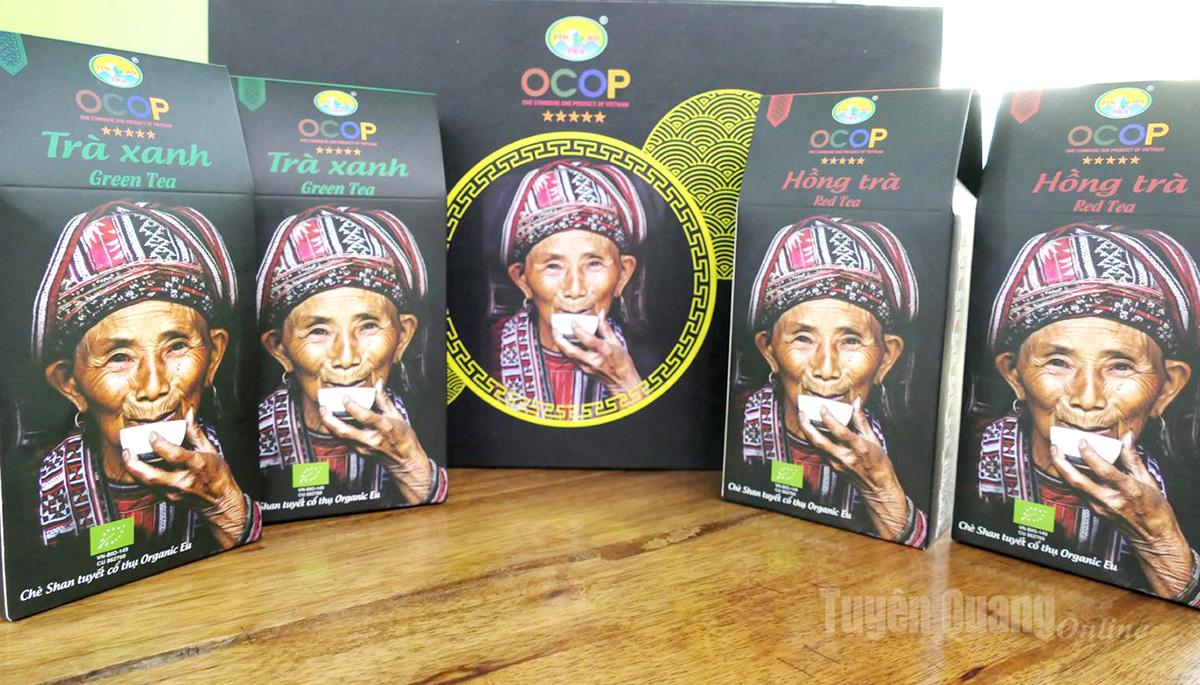
Phin Ho Tea Processing Cooperative’s products have received the national 5-star OCOP certification
In Cao Bo Commune, cooperatives and local producers are also tapping into international markets. “Our tea is mainly exported to China and Taiwan by order,” says Dao Minh Tuan, a member of the Cao Bo Tea Cooperative. “While the volume is still modest, it provides stable income and motivates us to keep caring for the ancient trees.”
Thanh Son Company is currently preparing to launch more exports to the U.S. Shan Tuyet tea from Tuyen Quang has reached over 20 countries and territories - part of a growing “Vietnamese tea journey” to the world.
Leveraging its unique advantages, the province has developed more than 40 OCOP-certified tea products, including two with 5-star national ratings. Shan Tuyet tea has even been served at high-level state receptions, further affirming its value and identity on the global stage.
Despite its promise, Shan Tuyet tea faces mounting challenges. Many plantations lack technical cultivation; value-chain linkages are weak; and international markets demand increasingly strict standards.
To ensure sustainability, Tuyen Quang is working toward a holistic strategy: Zoning ancient tea regions, preserving heritage trees, supporting organic conversion, and improving infrastructure. Ecotourism linked to Shan Tuyet tea and ethnic culture is also being developed. There is also a call for dedicated support policies and stronger local management.
With coordinated efforts and long-term vision, the “green gold” of Tay Con Linh can continue to thrive - lifting communities, preserving heritage, and bringing the essence of Viet Nam’s highlands to the world.
Nguyen Thanh Hieu
Vietnamese data source: Bao Tuyen Quang

